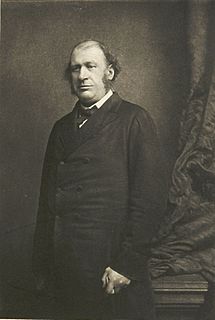A Quote by William Shakespeare
Friendship is constant in all other things Save in the office and affairs of love. Therefore all hearts in love use their own tongues. Let every eye negotiate for itself, And trust no agent; for beauty is a witch Against whose charms faith melteth into blood.
Related Quotes
To try to regulate the internal affairs of a family, the relations of love or friendship, or many other things of the same sort, by law or by the coercion of public opinion, is like trying to pull an eyelash out of a man's eye with a pair of tongs. They may put out the eye, but they will never get hold of the eyelash
Friendship, then, like the other natural loves, is unable to save itself. In reality, because it is spiritual and therefore faces a subtler enemy, it must, even more wholeheartedly than they, invoke the divine protection if it hopes to remain sweet. For consider how narrow its true path is. Is must not become what the people call a "mutual admiration society"; yet if it is not full of mutual admiration, of Appreciative love, it is not Friendship at all.
Art itself is essentially ethical; because every true work of art must have a beauty or grandeur of some kind, and beauty and grandeur cannot be comprehended by the beholder except through the moral sentiment. The eye is only a witness; it is not a judge. The mind judges what the eye reports to it; therefore, whatever elevates the moral sentiment to the contemplation of beauty and grandeur is in itself ethical.
We must look upon the world, with all its delights and all its attractions, with suspicion and reserve. We who love our Lord and whose affections are set on Heavenly things voluntarily and gladly lay aside the things that charm and ravish the world, that our hearts may be ravished with the things of Heaven; that our whole being may be poured forth in constant and unreserved devotion in the service of the Lord who died to save us.
Faith in the continuance and enhancement of the intrinsic values--faith in truth, in beauty, in friendship, in love and harmony of life--in short, faith in reason and the worth of spiritual life--such faith is only another name for faith in the persistence of spiritual individuality. For, I repeat, these values are real only as functions of personal experience and deed. To have faith in the permanence of intrinsic values is to assume the enduring reality of selves who know truth, feel beauty, who love and win spiritual harmony.
Genuine trust involves allowing another to matter and have an impact in our lives. For that reason, many who hate and do battle with God trust Him more deeply than those whose complacent faith permits an abstract and motionless stance before Him. Those who trust God most are those whose faith permits them to risk wrestling with Him over the deepest questions of life. Good hearts are captured in a divine wrestling match; fearful, doubting hearts stay clear of the mat.
Do not say that faith in Christ alone can save you, for this is not possible if you do not attain love for Him, which is demonstrated by deeds. As for mere faith: "The demons also believe and tremble" (James, 2:19). The action of love consists in heartfelt good deeds toward one's neighbor, magnanimity, patience, and sober use of things.
Parasitism is the only practice of the church; with its ideal of anaemia, its holiness, draining all blood, all love, all hope for life; the beyond as the will to negate every reality; the cross as the mark of recognition for the most subterranean conspiracy that ever existed-against health, beauty, whatever has turned out well, courage, spirit, graciousness of the soul, against life itself.





































